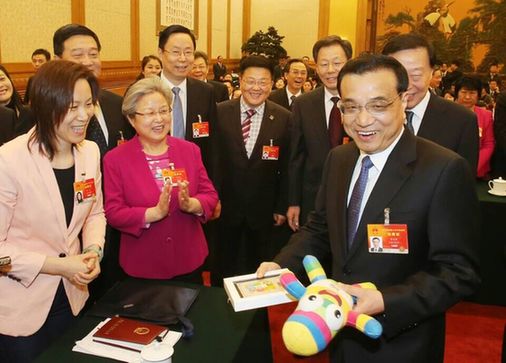The rich have a role at two sessions
Updated: 2015-03-13 10:24
(China Daily)
|
||||||||
 |
|
Chinese Premier Li Keqiang with NPC deputies from Jiangsu province.[Photo/english.jschina.com.cn] |
Should or should not more rich people attend the annual sessions of the National People's Congress and the Chinese People's Political Consultative Conference National Committee is a difficult question.
This year's Hurun Report, which monitors the fortunes of China's rich, says a record 203 of the 1,271 wealthiest Chinese - that is, one in every six - are delegates to the NPC or members of the CPPCC National Committee. Their number has increased from 155 last year, and the cumulative wealth of the 36 richest is about 1.2 trillion yuan ($191 billion), which is higher than Vietnam's GDP.
Many people are worried that the growing involvement of the super rich in the two sessions will further widen the wealth gap and increase social inequality. In fact, such a trend reflects China's economic development.
It is acceptable for rich Chinese, as Chinese citizens, to get more deeply involved in politics. But their rights and obligations should be the same as other NPC deputies and CPPCC National Committee members and they should not enjoy added privileges.
China is already the world's second-largest economy, with its GDP crossing $10 trillion in 2014, and the private sector as an important part of the country's socialist market economy has played a role in this development. Hence, to maintain economic growth under the "new normal" and expedite the transformation of the economic development model, the voices of Chinese entrepreneurs, especially the leading ones, who are good at innovation and possess cutting-edge technologies, have to be heard by policymakers.
But there is a fear that the rich NPC deputies could influence China's lawmakers by submitting proposals that are beneficiary to entrepreneurs. Therefore, measures should be taken to ensure they fulfill their political responsibilities strictly according to law.
- Global health entering new era: WHO chief
- Brazil's planning minister steps aside after recordings revelation
- Vietnam, US adopt joint statement on advancing comprehensive partnership
- European border closures 'inhumane': UN refugee agency
- Japan's foreign minister calls A-bombings extremely regrettable
- Fukushima impact unprecedented for oceans: US expert

 Stars of Lijiang River: Elderly brothers with white beards
Stars of Lijiang River: Elderly brothers with white beards
 Wealthy Chinese children paying money to learn British manners
Wealthy Chinese children paying money to learn British manners
 Military-style wedding: Fighter jets, grooms in dashing uniforms
Military-style wedding: Fighter jets, grooms in dashing uniforms
 Striking photos around the world: May 16 - May 22
Striking photos around the world: May 16 - May 22
 Robots help elderly in nursing home in east China
Robots help elderly in nursing home in east China
 Hanging in the air: Chongqing holds rescue drill
Hanging in the air: Chongqing holds rescue drill
 2.1-ton tofu finishes in two hours in central China
2.1-ton tofu finishes in two hours in central China
 Six things you may not know about Grain Buds
Six things you may not know about Grain Buds
Most Viewed
Editor's Picks

|

|

|

|

|

|
Today's Top News
Liang avoids jail in shooting death
China's finance minister addresses ratings downgrade
Duke alumni visit Chinese Embassy
Marriott unlikely to top Anbang offer for Starwood: Observers
Chinese biopharma debuts on Nasdaq
What ends Jeb Bush's White House hopes
Investigation for Nicolas's campaign
Will US-ASEAN meeting be good for region?
US Weekly

|

|







